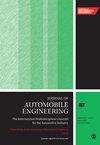晕车缓解回顾:驾驭智能汽车时代的挑战和机遇
IF 1.5
4区 工程技术
Q3 ENGINEERING, MECHANICAL
Proceedings of the Institution of Mechanical Engineers Part D-Journal of Automobile Engineering
Pub Date : 2024-08-28
DOI:10.1177/09544070241269607
引用次数: 0
摘要
长期以来,晕车(MS)一直是道路交通中的常见病。然而,在自动驾驶时代,MS 已成为一个越来越重要的问题。未来的智能汽车被设想为工作或娱乐的移动空间,但不幸的是,乘客参与非驾驶任务可能会加剧 MS。找到有效的 MS 对策对于确保乘客的愉快体验至关重要。然而,由于 MS 的机理复杂,在缓解 MS 方面存在诸多挑战,阻碍了实用对策的开发。为此,我们首先回顾了解释 MS 机制的两种流行理论。随后,本文概述了当前量化晕动病程度的主观和客观方法。然后,本文调查了缓解 MS 的现有方法,包括乘客调整、智能车辆解决方案和各种模式的运动提示。此外,我们还概述了当前研究的局限性和仍然面临的挑战,并强调了智能车辆背景下的新机遇。最后,我们提出了缓解多发性硬化症的综合框架。本综述的结论将加深我们对晕车的理解,并为未来在现代车辆中缓解 MS 的研究和实践提供宝贵的见解。本文章由计算机程序翻译,如有差异,请以英文原文为准。
A review of carsickness mitigation: Navigating challenges and exploiting opportunities in the era of intelligent vehicles
Motion sickness (MS) has long been a common complaint in road transportation. However, in the era of driving automation, MS has become an increasingly significant issue. The future intelligent vehicle is envisioned as a mobile space for work or entertainment, but unfortunately passengers’ engagement in non-driving tasks may exacerbate MS. Finding effective MS countermeasures is crucial to ensure a pleasant passenger experience. Nevertheless, due to the complex mechanism of MS, there are numerous challenges in mitigating it, hindering the development of practical countermeasures. To address this, we first review two prevalent theories explaining the mechanism of MS. Subsequently, this paper provides a summary of current subjective and objective approaches for quantifying motion sickness levels. Then, it surveys existing methods for alleviating MS, including passenger adjustment, intelligent vehicle solutions, and motion cues of various modalities. Furthermore, we outline the limitations and remaining challenges of current research and highlight novel opportunities in the context of intelligent vehicles. Finally, we propose an integrated framework for alleviating MS. The findings of this review will enhance our understanding of carsickness and offer valuable insights for future research and practice in MS mitigation within modern vehicles.
求助全文
通过发布文献求助,成功后即可免费获取论文全文。
去求助
来源期刊

CiteScore
4.40
自引率
17.60%
发文量
263
审稿时长
3.5 months
期刊介绍:
The Journal of Automobile Engineering is an established, high quality multi-disciplinary journal which publishes the very best peer-reviewed science and engineering in the field.
 求助内容:
求助内容: 应助结果提醒方式:
应助结果提醒方式:


